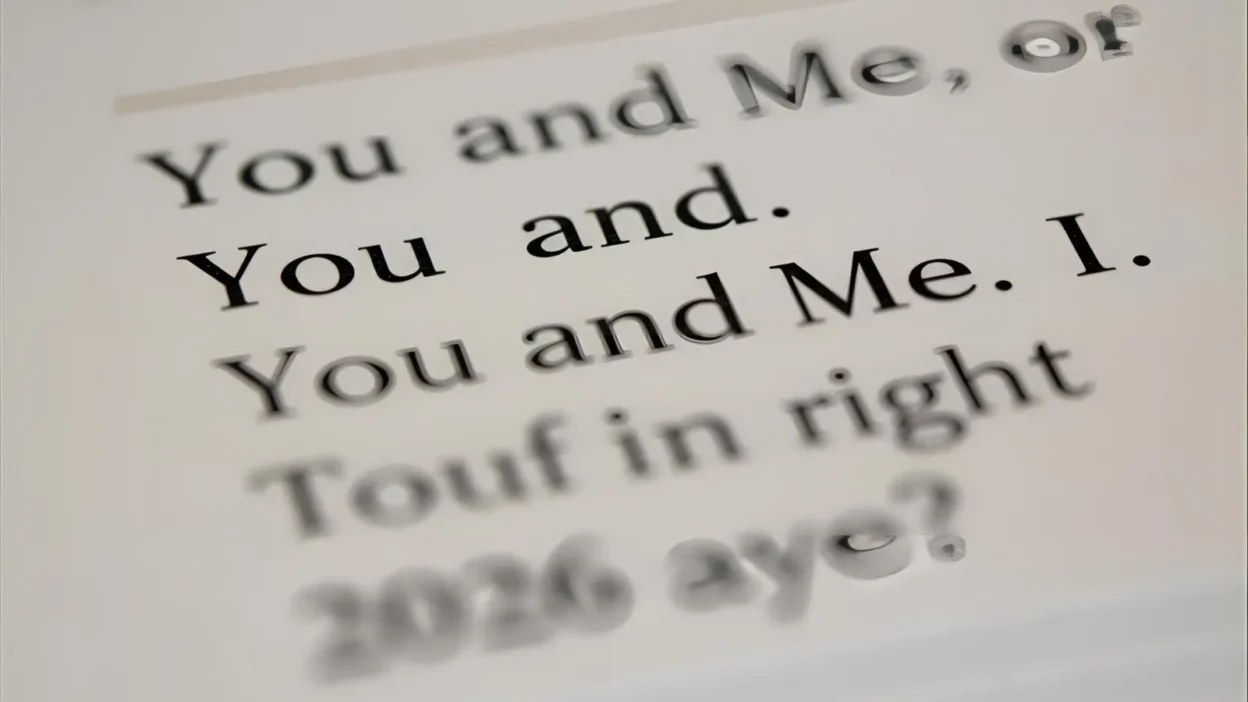Ever stopped mid-sentence wondering if you should say “you and me” or “you and I”? You’re not alone.
This little grammar puzzle confuses millions of English speakers, even native ones.
People search for this keyword daily because both versions sound right in different sentences — but only one is correct, depending on grammar rules.
Understanding the difference helps you sound more polished, whether you’re writing an email, posting on social media, or giving a presentation.
The phrase “you and me or you and I” isn’t just about rules — it’s about using English naturally and confidently.
This article clears up the confusion once and for all, with simple examples, clear explanations, and tips you can apply instantly.
You and Me or You and I – Quick Answer
✅ Use “you and I” when the phrase is the subject of the sentence.
✅ Use “you and me” when the phrase is the object of the sentence.
Examples:
- Correct: You and I are going to the park. (subject)
- Correct: The teacher called you and me. (object)
- ❌ Wrong: You and me are going to the park.
- ❌ Wrong: The teacher called you and I.
A quick trick:
Remove “you” — if the sentence still works, it’s correct.
👉 “I am going” (✅) → You and I.
👉 “The teacher called me” (✅) → You and me.
The Origin of “You and Me or You and I”
The distinction between “I” and “me” comes from Old English pronouns — ic (I) and mec (me). Over centuries, as English simplified, the rules remained: I is the subject, me the object.
Early writers like Shakespeare sometimes broke these rules for rhythm or rhyme, which adds to modern confusion. For example, he wrote “All debts are cleared between you and I” — grammatically wrong today but accepted in poetic speech back then.
So, while history shows flexibility, modern English keeps a clear line: subject = I, object = me.
British English vs American English Spelling
Interestingly, both British and American English agree on the grammar of “you and me” vs “you and I.” The difference lies in tone and formality rather than spelling.
| Context | British English | American English | Example |
| Formal writing | you and I | you and I | “You and I should attend the meeting.” |
| Casual speech | you and me (often informal) | you and me (informal) | “It’s just you and me today.” |
| Grammar rules | Same | Same | “She gave the tickets to you and me.” |
In both regions, “you and I” sounds slightly more formal, while “you and me” feels relaxed and conversational.
Which Spelling Should You Use?
Your choice depends on audience and context:
- 🏛 Formal or professional settings: Use you and I when it’s the subject.
Example: “You and I will finalize the report.” - 💬 Casual speech or texting: You and me feels natural when used as the object.
Example: “It’s between you and me.” - 🌍 Global or online audience: Stick to grammar rules rather than regional habits. Correct grammar works everywhere.
Common Mistakes with “You and Me or You and I”
- ❌ You and me are best friends.
✅ You and I are best friends. - ❌ The manager spoke to you and I.
✅ The manager spoke to you and me. - ❌ Between you and I, that’s a bad idea.
✅ Between you and me, that’s a bad idea. - ❌ You and me should go first.
✅ You and I should go first.
Tip: Always test the sentence by removing “you” — it’s the fastest way to check correctness.
You and Me or You and I in Everyday Examples
In emails:
✅ “You and I should schedule a meeting.”
✅ “Thank you for helping you and me complete the task.”
In news headlines:
“You and I Must Act Now to Save Our Planet” (Editorial Style)
“Between You and Me: The Truth Behind Celebrity Friendships”
In social media posts:
“It’s just you and me against the world ❤️”
In formal writing:
“You and I agree that teamwork leads to success.”
The key is to match the tone and grammatical role — subject or object — to the situation.
You and Me or You and I – Google Trends & Usage Data
Google Trends shows that searches for “you and me or you and I” peak in English-speaking countries, especially the United States, United Kingdom, Canada, and India.
| Country | Popular Search Form | Common Usage Context |
| United States | you and me | Everyday speech |
| United Kingdom | you and I | Formal writing |
| Canada | you and me | Mixed use |
| India | you and I | Academic and formal English |
The phrase is often searched by students, professionals, and writers who want clarity in formal communication.
FAQs
1. Which is grammatically correct – “you and me” or “you and I”?
Both can be correct depending on sentence structure. “You and I” for subjects, “you and me” for objects.
2. Can I ever use “you and me” at the start of a sentence?
No, unless it’s informal or poetic. Use “you and I” as the subject.
3. Why do people say “between you and I”?
It sounds formal, but it’s wrong. The correct form is “between you and me.”
4. Is “me and you” ever correct?
Grammatically yes (as an object), but stylistically it’s better to put “you” first: “you and me.”
5. Does it matter in spoken English?
In casual speech, people often mix them up, but in writing or formal speech, correctness matters.
6. What’s the easiest way to remember?
Remove “you” and test the sentence. If “I” fits → “you and I.” If “me” fits → “you and me.”
7. Is “you and I” more polite than “you and me”?
Yes, slightly. “You and I” sounds more formal and refined.
Conclusion
The debate between “you and me” and “you and I” ends once you know the grammar rule: subject = I, object = me. Whether you’re writing professionally or chatting casually, choose the phrase that fits your sentence role.
Use “you and I” in formal writing and “you and me” in relaxed contexts. The trick of removing “you” will always guide you to the correct form. Remember, good grammar isn’t about sounding perfect — it’s about communicating clearly and confidently.
So next time you write, speak, or post online, you’ll know exactly which phrase makes you sound natural, polished, and grammatically right.
Discover More Articles:
- Twisted Nerve Ready or Not The Creepy Whistle That Defined the Scene 2026
- Love Me or Leave Me Meaning, Usage, and Spelling Guide 2026
- Shit or Get Off the Pot Meaning, Origin, and Usage 2026
- Flavorful or Palatable Which Word Is Right and When to Use It? 2026



